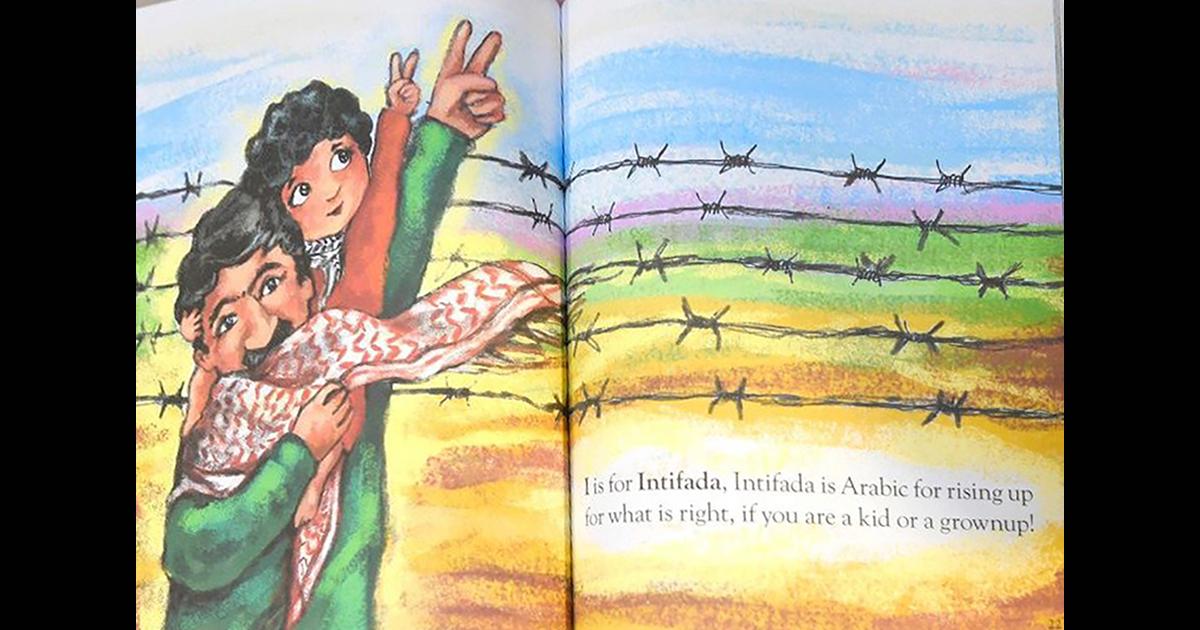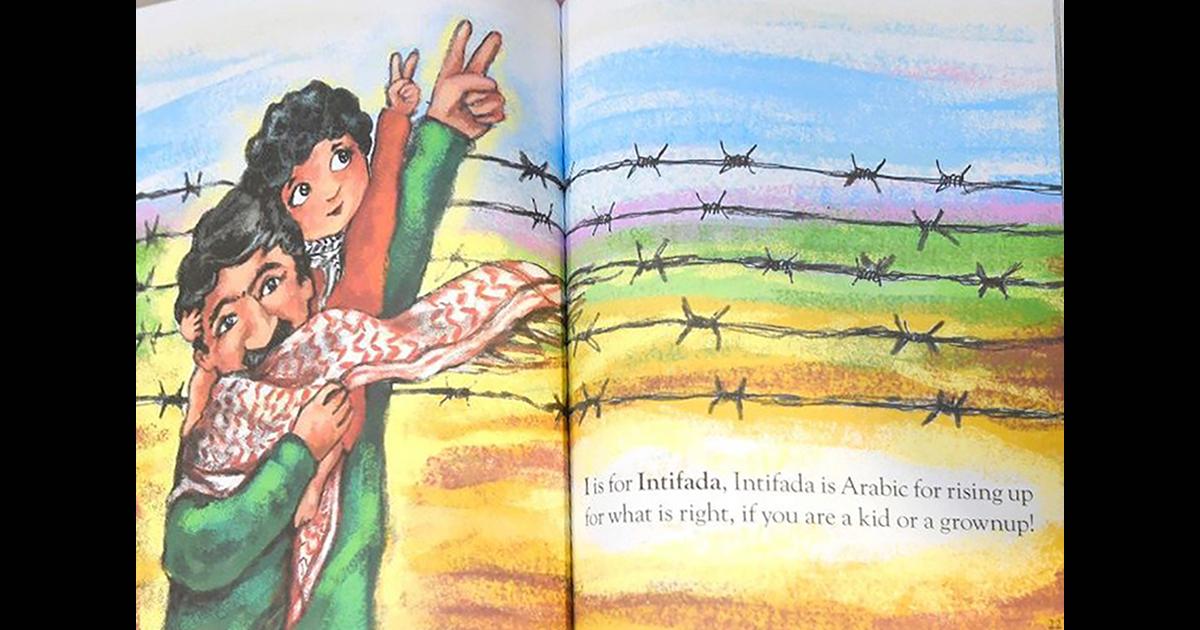
Golbarg Bashi, author of the 2017 self-published children’s book P Is for Palestine, was invited by the Central New Jersey chapter of the Jewish Voice for Peace (JVP), to present her book at a family-friendly event at the Highland Park Public Library on May 19. The event was listed by the library without JVP listed as a sponsor or organizer.
After objection from Highland Park’s vibrant Jewish community, the event was postponed, initially pending a May 20 public meeting of the library’s board of trustees.
However, after national and international public and media interest, the library announced via its website that the meeting would be further delayed to June 5. A source told The Jewish Link that the library was still seeking a venue for a larger-than-expected crowd, and that the event would be moved until after June 4 so that Muslims observing Ramadan could conveniently attend the evening meeting.
“Due to the overwhelming public response to the children’s program “P is for Palestine,” the Library Board’s May 20 meeting is being rescheduled for June 5 at 7:30 p.m. The library is actively seeking a venue that can accommodate the expected turnout of the public. When the library secures a venue, proper notice will be provided including updating our website,” the library’s message stated.
The event has been determined to be the first of multiple book events planned by Jewish Voice for Peace (JVP)’s Central New Jersey chapter. On May 16, an updated Facebook message appeared on the group’s page, noting the event at Highland Park’s library was the first planned as part of a series. “This was the (sic) to be the 1st in a series of collaborations between JVP – Central New Jersey and local libraries to foster cross-cultural enrichment, tolerance, and conflict management for children,” the message stated.
However, the post continued, “Our event, meant to promote tolerance, was canceled due to intolerance and the promulgation of proven falsehoods about Palestinians.”
Falsehoods about Palestinians, however, were not the Jewish community’s primary concern. Rather, the town’s residents expressed that the alphabet book is considered offensive and unfriendly to those who support the Jewish right to a self-determined state. For example, the illustration for “I” stands for “Intifada.”
To members of the Jewish community, “Intifada” refers to two separate bouts of prolonged Palestinian violence and terror—from 1987 to 1991, and 2000 to 2005—during which some 1,300 Israelis were killed, in the Second Intifada mainly by suicide bombers, as well as many Palestinians.
Bashi, an instructor of Middle East studies at nearby Rutgers University, wrote on Facebook that her definition of “Intifada” connotes the Palestinian people’s “resistance movement, most of which is manifested in peaceful protest.”
The purported peace-loving Bashi, who in the past week posted on her public Facebook page about #Nakba (catastrophe) Day —referred to by Jews as Israeli Independence Day, the day that Israel was declared a state by the United Nations — and shared a photo of a woman starting she preferred a revolution to Mother’s Day flowers. She also shared a photograph that originated on the page of radical Israel critic and disgraced academic Norman Finkelstein, with the caption, “So how come Israel gets to use chemical weapons without being bombed by the U.S., Britain & France?”
However, most of Bashi’s posts over the last two weeks have been about her postponed author event in Highland Park, and she posted on Facebook almost immediately following the event’s cancellation. “The public library in the state of New Jersey (funded by U.S. tax-payer monies) and under the protection of the U.S. First Amendment was forced by Israel Advocates to ban my book, and actually cancelled a community event that had been organized months in advance–Zionists break American law, slander, smear and deprive myself and other Palestinian rights defenders from earning an income from our trade. Not to mention inciting violence against us. I continue to receive death-threats. #PIsForPalestine #BookBanning”
Later, she referred to her book as protected under the first amendment. “It is laughable and yet extremely dangerous when news of breaking of the law (the first amendment) by Israel Advocates in a state of New Jersey becomes major news in Israel AND this news is presented in a distorted manner,” she wrote, while sharing images of the coverage of the book event’s postpostment on major web-based Jewish news outlets.
Apparently since not enough anti-semitic tropes appeared to have been used in this case, Lida Martin, a commenter on one of Bashi’s Facebook posts about the event postponement on May 8, stated, “This is a good example of Zionist Control in US! For people who are still in denial!”
The American Library Association steps in
The Jewish Link learned that May 9, Kristin Pekoll, the assistant director for the office of intellectual freedom at the American Library Association, sent an email to Jane Stanley, director of the Highland Park Public Library. This message, obtained by The Jewish Link, contained an offer of support to Stanley and subsequently provided a memo containing directives regarding policies for canceling events.
“It may be appropriate to disinvite a speaker or cancel a program or event when there is a facility issue or inclement weather. It is not appropriate when the topic is controversial or if there have been complaints about the speaker, program, or event. If there is a credible public safety threat, library workers should consult with legal counsel and local law enforcement.”
The memo shared views regarding the ramifications of the library were to cancel the event. “Canceling a speaker, program, or event because of real or anticipated controversy could negatively impact the reputation of the library and its ability to serve the community as a forum for the exchange of ideas. There could also be public relations, legal, financial, or other contractual implications,” the memo stated.
The memo then referred to its own definition of obligations, contained in a so-called “library bill of rights.”
“Article II of the Library Bill of Rights states, ‘Materials should not be proscribed or removed because of partisan or doctrinal disapproval.’ Likewise, programs should not be canceled because of the ideas or topics of the program or the views expressed by the participants or speakers. Library sponsorship of a program does not constitute an endorsement of the program content or the views expressed by the participants or speakers, any more than the purchase of material for the library collection constitutes an endorsement of the material content or its creator’s views. Libraries should vigorously defend the First Amendment right of speakers and participants to express themselves. Concerns, questions, or complaints about library-initiated programs are handled according to the same written policy and procedures that govern reconsiderations of other library resources.”
The memo then concluded with a clear endorsement of the book attributed to “Intellectual Freedom Blog” post from February 13, 2018. “Despite everything, the first ABC picture book about Palestine is definitely an important book for people of Palestinian heritage who want to share it with their children.”
JVP, on its Facebook page, provided a set of talking points for its advocates, which contained much of the same language as the ALA memo:
“The American Library Association’s Library Bill of Rights states that libraries:
- should provide information presenting all points of view on current and historical issues. Materials shouldn’t be proscribed or removed because of partisan/doctrinal disapproval.
- should cooperate with all persons and groups concerned with resisting abridgment of free expression and free access to ideas.
- which make exhibit spaces and meeting rooms available to the public they serve should make such facilities available on an equitable basis, regardless of the beliefs or affiliations of individuals or groups requesting their use.”
JVP concluded its post by asking its members to attend the June 5 meeting to show support for the reinstatement of the “P Is for Palestine” program. It also encourages members to write and call the Highland Park Public Library and to write and call newspapers and media organizations to register support for the program.
Requests for comment from the American Library Association and Highland Park Public Library’s legal counsel went unanswered at press time.
ZOA Responds
The Jewish Link was provided with a copy of a letter that Zionist Organization of America wrote, dated May 15, 2019, to the Highland Park Public Library, voicing its strong objection to the “P Is for Palestine” author event. The letter is signed by National President Morton A. Klein, and the ZOA Center for Law and Justice Director Susan B. Tuchman and Alan Jay, president of ZOA’s New Jersey chapter.
“After reviewing the book, we strongly urge you not to permit the book reading to go forward at the library. The book promotes and praises violence. It will misinform and mislead children, instead of encouraging tolerance and understanding. And it will service the hateful agenda of an extremist anti-Israel group, rather than the mission of the Highland Park Public Library to be a community resource.”
“JVP is behind the scheduling of this book reading and it is the group that continues to push for it. JVP may have an innocuous and even appealing name, but the Anti-Defamation League has appropriately described it as ‘a radical anti-Israel activist group’ that ‘considers supporters of Israel, or even critics of Israel who do not hew to JVP’s own extreme views, to be complicit in Israel’s purported acts of racist oppression of Palestinians.
“JVP’s purported concern for children does not extend to the Israeli and Jewish children who have endured and continued to be threatened by Arab terrorism. A book that misinforms and misleads children into believing that Palestinian Arab terrorism against Israelis and Jews is not only acceptable but also desirable, inspirational and heroic does nothing to inform, enlighten or encourage dialogue,” said ZOA in its letter.
Editor’s note: Rochelle Kipnis contributed to this report.









